project44 Streamlines Carrier Connectivity Processes
Chicago, Illinois USA Site Visit
February 1, 2017
Key Personnel:
Jett McCandless – Founder and CEO
Tommy Barnes – President
Steven Jones – VP, Product Management
Steve Henkles – VP, Engineering
Darryl Anderson – Chief Architect
project44 Overview
project44 is a modern technology network providing a growing suite of application program interface (API) based transportation solutions. project44 empowers shippers and third-party logistics (3PL) providers to communicate and transact with their transportation capacity providers in real time. For clients integrating into the network the concept is purposefully minimalist. Rather than managing multiple traditional technologies such as Electronic Data Interchange (EDI), FTP, and traditional motor carrier rate bureaus, shippers and 3PLs connect into project44 to instantly access capacity provider data from directly within their Transportation Management Systems (TMS). One of the most important differentiators in project44’s network model is the ability to normalize various data sets, delivering complex carrier data in a standardized, secure manner.
Ultimately, project44 clients are able to:
- Increase internal efficiencies. project44 clients have demonstrated an ability to move and respond faster with lower overhead.
- Deploy integration solutions faster. Setup is a single occurrence, takes days rather than months, and is a one-to-many connection.
- Deliver a superior experience to customers.
- Save money. project44’s cost is a fraction of the cost of legacy solutions.

project44 History
Founded in 2014, Chicago-based project44 has grown rapidly. It launched its first Freight API Core Service in December 2015. Since then, the company has expanded its reach to include additional capacity providers, integrating more than 1,000 disparate functional APIs and facilitating over 2.1 million API transactions per day. In September 2016, Chicago Ventures and Emergence Capital led a $10.5 million Series A venture capital investment in the company. Emergence Capital cited project44’s focus on a single industry vertical, a substantial less-than-truckload (LTL) customer base, and a team of industry veterans as particular strengths. As a result of the investment, project44 more than doubled its headcount, and now has 31 employees. Seventeen employees are on the technology side of the business; the remainder hold account management, sales and marketing, and customer engagement roles. The company moved to larger offices in November 2016 to accommodate the expansion.

In 2016, project44 more than tripled its customer base. The company has more than 65 enterprise clients including retailers, manufacturers, 3PLs, and carriers. Notable clients include Worldwide Express, DSV, Estes, Venus Group, UTi Worldwide, Odyssey Logistics & Technology, CaseStack, and BlueGrace Logistics.
project44 initially focused on the LTL market (company president Tommy Barnes estimates that over 99% of LTL carrier capacity is represented). The company will continue to expand its API network to include truckload (TL), intermodal/rail, ocean, and air.
API vs. Traditional Technology
For decades, Electronic Data Interchange (EDI) has been the default means of data transfer between carriers, shippers, and 3PLs. project44 aims to replace incumbent technology – including EDI, web scraping, and rating software – with web service APIs. APIs allow many types of software, written in any programming language, to communicate easily, securely, and cost-effectively. project44’s premise is that many of the challenges inherent in traditional methods of data transfer can be alleviated or solved by the transition to APIs.
Most logisticians are familiar with the challenges of EDI. Back-and-forth data transactions can take minutes or hours, and in some cases, fail altogether. Trading partner implementation is a lengthy and often tedious process. While EDI is technically a ‘standard,’ few standards are used; fields are often highly customized for a given shipper and information types are limited. Business processes arising to accommodate the challenges of EDI are inefficient. However, transportation and logistics providers have continued to rely on EDI. It is an entrenched part of the transportation industry. Many businesses are waiting to see which technologies can prove staying power before investing in new approaches.
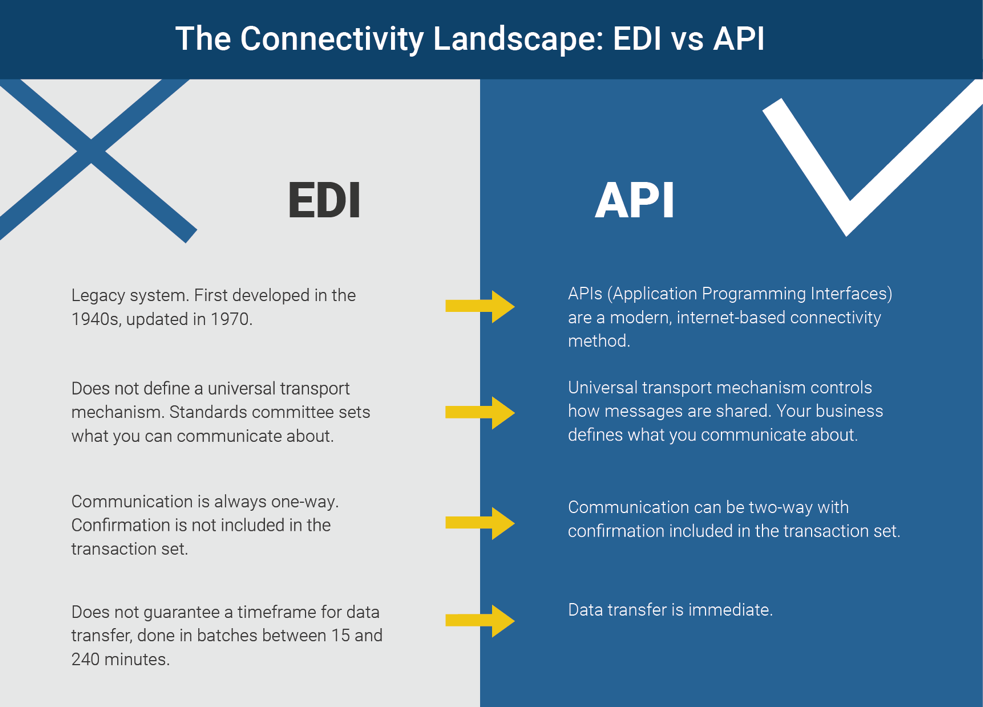
Other methods of data retrieval, namely web scraping and rating software, also present challenges. Web scraping can lead to extraction delays. Structured data errors grow as scale increases. Traditional rating software can be expensive and comes with integration issues or manual processes of its own.
Despite the longevity of EDI, market pressures are exerting strain on the status quo. 3PLs must deliver real-time shipment visibility to their customers while maintaining more efficient operational processes. project44 has provided a compelling proof of concept, using APIs to address many of the challenges posed by EDI, FTP, and traditional rate bureaus.
The application of APIs in the transportation and logistics industries is relatively recent, although APIs have been in use in other industries for more than 15 years. The founders of project44 recognized the potential for APIs to standardize and accelerate the transfer of transportation data. Jett McCandless, founder and CEO of project44, says, “data normalization is the magic of project44’s network.” The company’s APIs return what would otherwise be a complex, variable array of capacity provider data in a normalized, secure manner that is easy for clients to consume and understand.
Besides normalization and security, the other main benefit of APIs is speed. Data transfer occurs in seconds, meaning carrier data is visible in real time. Communication is also two-way – confirmation of receipt is included in the transaction set. EDI, on the other hand, is batched and sent via a schedule, which can vary from 15 minutes to two hours. Communication is one-way, and the lack of an immediate confirmation message causes additional confirmation EDI transactions or manual processes to arise. Many 3PLs devote staff to fielding confirmation phone calls.
The market has proven the value of APIs. Companies from Amazon to Uber utilize APIs. In the logistics industry, some TMS software companies and 3PLs (such as McLeod, MercuryGate, and C.H. Robinson) have built their own APIs. In a May 2016 survey of 900 IT decision makers, the software company MuleSoft found that 91% of companies have or expect to have an API strategy in place by the end of 2016. Those in the logistics industry also recognize the importance of APIs.
How project44 Works
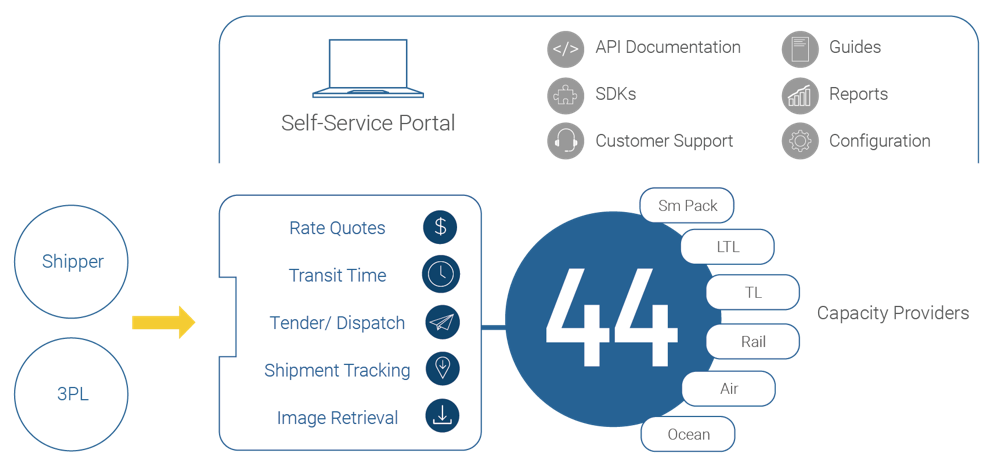
3PL and Freight Brokerage Clients
3PLs, including transportation managers/freight brokerages, are experiencing significant pressure to increase operational performance. Executives are faced with increased competition and are looking for ways to improve operational efficiencies.
project44 provides an alternative “backend” connectivity option to the existing technology choices, enabling 3PLs to use their TMS or order management system as they’ve always done with enhanced performance and capabilities.
Unlike point-to-point integration solutions typical of EDI and other traditional technologies, project44’s one-to-many network provides shipper and 3PL clients with the infrastructure required to quickly go to market, flexibly react to ever-changing IT requirements, and scale without added integration complexity. The result is instant visibility to rate quotes, transit times, shipment status information, imaged documents, invoicing, and dispatch/load tender.
New project44 clients typically require only two to three weeks of a developer’s time to plug into and access the entire project44 network. The company guides clients through the entire onboarding process.
The Transportation Capacity Provider Network
By plugging into project44, capacity providers avoid the restrictions of legacy systems, outdated messaging formats, and inefficiencies. Most capacity providers are faced with long, costly lead times to establish EDI connections with individual clients. Those connections are expensive, time-consuming, and cumbersome.
project44 offers a one-to-many integration approach that allows providers to plug into an established network at a fraction of the cost and time. Rather than create a new EDI implementation each time a shipper or 3PL establishes a relationship with a carrier (many-to-many), APIs are written once and used in the same way (one-to-many). Once these connections are established, they can be used indefinitely. For example, once project44 connects its API to access Estes’s shipment tracking data, any of project44’s shipper or 3PL clients can quickly and easily access the data via a TMS or order management system.
Each capacity provider publishes its system documentation and project44 connects to it. No customization is required on the carrier side. Since new capacity provider onboarding is reduced from months to days (or even hours), project44 also regularly adds new connections to expand the network’s breadth.
Core API Services
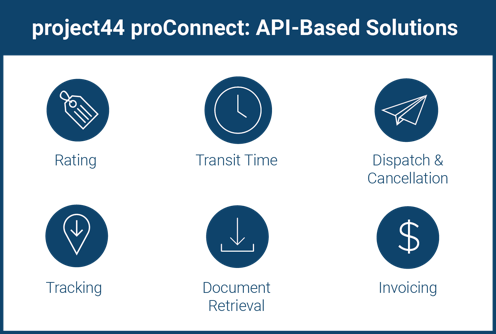
project44 provides one set of Core Service APIs for rate quotes, transit times, dispatch (replacing EDI 204), tracking (replacing EDI 214), imaging (replacing FTP), and invoicing (replacing EDI 210). Organizations can eliminate at least three different technologies with a single, modern connectivity solution. project44’s most popular API-based services are detailed below:
Accurate Rate Quotes and Transit Times
project44 APIs automate the delivery of rate quotes directly from their network of capacity providers, while also providing a level of data normalization to improve overall data integrity and reduce data anomalies, redundancies, and duplications typical of traditional technologies.
For the LTL mode specifically, rates can be direct with carrier, contractual rates, pallet rates, blanket rates, or customer specific pricing. Rates can accommodate different minimum charges, accessorial charges, and weekly fuel surcharge updates. Rate quotes obtained via APIs preclude the need for traditional rating software subscriptions and pre- and post-audits of invoices and quotes.
In addition, project44’s transit time API provides visibility into live, lane-by-lane transit times. Hardcoded or database-managed transit times can both underestimate and overestimate the actual time until delivery. Dynamic transit times, which capacity providers can assign by day, lane, or customer, give project44 clients visibility into the true expected arrival date.
On-Demand Shipment Tracking
Without real-time tracking data, which is only possible with APIs, office staff often resort to phone calls to carriers, especially near the end of the day if batched EDI transmissions have not yet arrived. project44’s APIs give real-time visibility into key milestones: pickup, origin terminal departure, and delivery.
Instant Image Retrieval and Proof of Delivery
Shippers and 3PLs can retrieve Proof of Delivery, Bill of Lading, and Weight & Inspection documentation. Office staff save time on the typical process of making phone calls or logging into separate websites to access documents.
Cloud Security
project44’s enterprise SaaS solution is deployed on Amazon Web Services (AWS), which is recognized for its flexibility, scalability, and reliability. The project44 SaaS solution leverages AWS’s trusted security platform and features, such as Virtual Private Clouds (VPCs), encryption, and firewalls. All data and credentials are encrypted in flight and at rest. Security controls specifically include private management subnet, VPNs, and multifactor authentication.
Code scans are run against all major and minor code releases to check for vulnerabilities and compliance with best practices. Furthermore, a Chicago-based team monitors the current, ever-changing security landscape.
Partnerships
project44’s first clients were 3PLs using proprietary TMSs but the company has since expanded to build global configurations with top TMS companies including McLeod Software, 10-4 Systems, Next Generation Logistics, Cloud Logistics, Revenova, MercuryGate, 3GTMS, Trucker Tools, and MacroPoint.
project44’s LTL APIs will be available in McLeod’s PowerBroker, 10-4’s Freight Portal, and Revenova’s Salesforce.com-based TMS. Location tracking from MacroPoint has been added to project44’s network.
Customer Case Studies
3PL Achieves an 11% Margin Increase with Rate Quotes
A 3PL with $52 million in revenue engaged project44 to replace its rating software. The company struggled with high software costs, and incurred costs and productivity losses uploading and managing tariffs and fuel surcharges. Staff manually checked rates with carriers to monitor changes and ensure accuracy.
The 3PL worked with project44 to implement the rate quotes API. The majority of manual tasks (phone/email, database management, and data scrubbing) were eliminated, which reduced errors and improved customer satisfaction. Four full-time employees who previously managed these tasks were repurposed to revenue-generating roles. The 3PL achieved a 30–35% increase in revenue, and an 11% increase in gross margin.
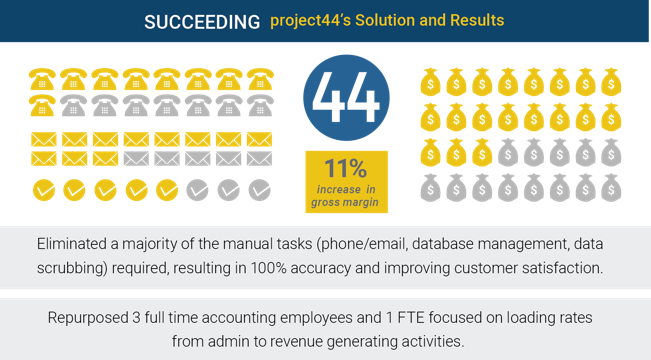
Another 3PL saves $816K with Tracking
A $200 million freight brokerage employed 21 full-time employees who spent most of their time tracking shipments. To manage nightly shipment tracking, the company employed customer service reps in India. EDI 214 feeds with missing or old tracking data required manual retrieval and clean up, while stale data frustrated clients.
project44’s tracking API enabled the brokerage to repurpose 17 FTEs from administrative to revenue-generating activities. Additionally, 40% of the EDI team moved to other operational roles. The company also ended its outsourced activities. The company saved $816,000 annually. Moreover, visibility into instantaneous tracking data improved relationships with both carriers and shippers.
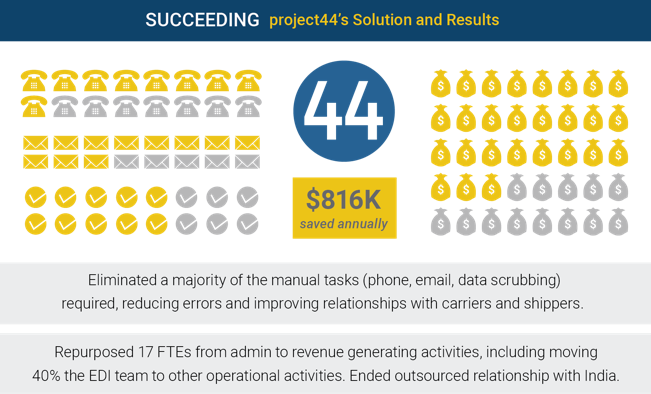
Improving a $1B 3PL’s Operations with Dispatch
The fastest growing 3PL, with over $1 billion in revenue, experienced connectivity challenges with EDI 204 (Dispatching/Load Tender). The company viewed dispatch as the largest gap in its LTL operations. Inaccurate information sent to carriers caused numerous downstream problems, such as delivery delays, customer attrition, and employee churn.
With more than 6,000 LTL shipments per day, dispatching operations are paramount to the company. The 3PL enlisted project44’s dispatch API. The company was able to repurpose 67% of operational employees from manual, administrative tasks to revenue-generating functions. In total, the company saved $1.1 million annually.
This 3PL was one of project44’s earliest clients, joining during the Beta phase. In addition to dispatch, the firm has since added tracking (achieving $1.2 million in annual savings), and is implementing rate quote.
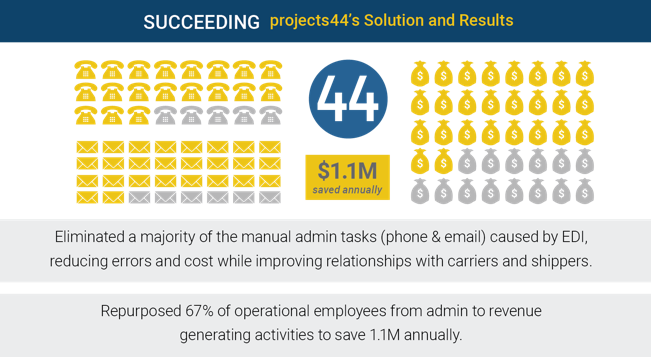
Summary: An Established Player with a Bright Future
project44 has achieved rapid growth in terms of clients, scope, staff, and investment. The company has capitalized on applying an established technological trend to transportation management. Shippers, 3PLs, and carriers alike have seen efficiency and cost benefits. Investor confidence, customer expansion, and partnerships with major logistics providers attest to the promise of project44’s concept.
In the coming years, project44 will look to expand its API network to new transportation modes and geographical markets. project44’s primary focus has been domestic LTL, but in 2017 and 2018, the company will aim to replicate the model for additional markets including truckload, intermodal, and ocean. The company has already begun work on new types of API connections. Finally, project44 is in a unique position to leverage data to develop predictive analytics capabilities.
Looking forward, we believe the model should translate well from LTL to TL and Intermodal providers, enhancing the potential customer base. It should also translate internationally. Its access to data could allow project44 to continue to evolve its mission and leverage data for predictive analytics – a capability which is in demand by many 3PLs.
While there are few barriers to entry to the API market, normalizing and building a secure network takes significant expertise. project44 has established itself as the early player in transportation data communication, especially in LTL. The connections already established with carriers will serve project44 in retaining leadership.


